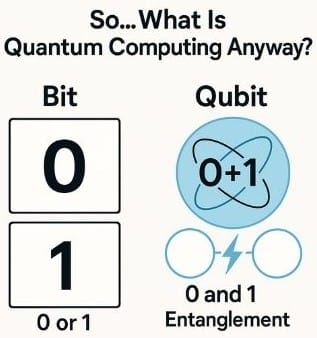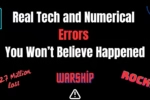You know how our computers run on 1s and 0s, right? Like, that basic “on or off” digital logic powering everything from your iPhone to whatever AI tool you used to write your last assignment? Now imagine a computer that can be on AND off at the same time. Quantum computers are basically like, “What if we just break logic for fun?” And the craziest part? It works.

What Even Is Quantum Computing?
Think of classical computers like really fast calculators—they’re great, reliable, and they get the job done. But there’s stuff they just suck at. Like simulating atoms, cracking super tough encryption, or finding the most efficient delivery route out of a trillion possibilities.
Quantum computers run on qubits instead of bits. These things don’t pick sides. Thanks to quantum physics (which is wild, btw), a qubit can be a 0, a 1, or both at once. That’s called superposition. It’s basically the Schrödinger’s cat of computing — it’s not just one thing until you look at it. Then there’s entanglement. That’s when two qubits get so linked up that changing one instantly affects the other, no matter how far apart they are. It’s like having two besties who know what each other is thinking even if one’s in space.
Put that together, and you’ve got a machine that doesn’t just compute faster — it thinks in ways our regular computers can’t even touch.

Why Should You Care? Like, What Can This Even Do?
Quantum computing is already being explored for:
- Creating new drugs by simulating molecules (faster than any lab)
- Breaking current encryption (so yeah, cybersecurity’s about to get real)
- Solving optimization problems that would take today’s computers centuries
Companies like IBM, Google, and startups like Rigetti are deep into this. Even Wall Street is catching on — there’s an actual ETF for quantum tech now. Not even kidding. Investors are betting big.
And here’s the real win: if you get into this stuff early, you’re not just learning something cool — you’re making yourself future-proof. There’s already demand for quantum developers and researchers, and it’s only gonna grow.
Wanna Learn Quantum Without Losing Your Mind?
You don’t need a PhD to get started. Seriously.
Start with Quantum Country — it’s like if Anki flashcards went to MIT. Then jump into IBM’s Qiskit. It actually lets you play with quantum code and run it on real machines. Free. No joke.
Microsoft’s Quantum Katas are like coding puzzles that teach you quantum logic step-by-step. And if you’re a video-first learner, hit up 3Blue1Brown, minutephysics, or Coding Tech on YouTube. These dudes explain stuff in ways that actually make sense.

Quantum vs Cloud: Different Leagues, Same Game
Cloud computing? That’s your day-to-day MVP. Runs your apps, stores your files, powers your Netflix binging. Super useful. Super scalable. Very… normal.
Quantum computing? That’s the wildcard. It’s not replacing cloud — it’s more like its genius cousin who shows up once in a while, solves an impossible puzzle, and vanishes into the lab again.
Cloud is general-purpose. Quantum is problem-specific. You won’t run your blog on a quantum machine — but you will run your next-gen AI model or cryptographic simulations there, once the tech’s mature enough.
And guess what? Big players are already integrating both. IBM and Microsoft offer quantum computing as a service through the cloud. That’s where it’s headed — a fusion of both worlds.




Pingback: Master How to Speak in Interviews and Impress Instantly